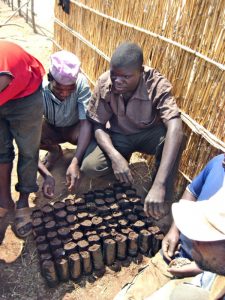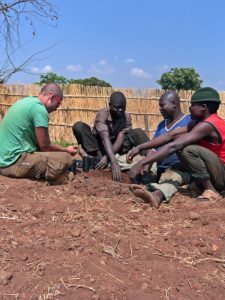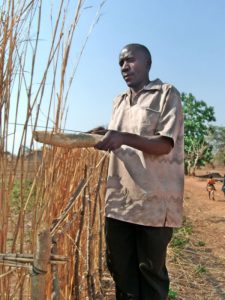 Location
Location
Mndolera, T/A Dzoole, Dowa District, Malawi
Community Description
Mndolera is situated approximately 25 kilometers from Mponela, the nearest trading center on a tarmac road. The village has about 200 residents, with women and children comprising over 50% of the population.
The primary source of income is the growth and sale of tobacco by small stakeholders. This leaves little land available for other crops, with almost all available land not used for tobacco being used for maize.
Every Child CBO is a community-based organization focusing on child development and care of people living with HIV. They have established a small-scale medicinal and nutritional garden on a half-acre plot donated by area chefs. The garden has numerous fruit trees including mangoes, guavas, papaya, and tangerines. They are also growing tomatoes, various leafy vegetables, soya, and garlic. The plan is to expand this garden using permacultural practices to increase the variety and volume of beneficial plants being grown on-site for community use.
Due to the garden’s location, watering has been an issue. The nearest well is located about ½ kilometer from the garden and is ‘owned’ by an area chief who charges by the bucket. The garden was established prior to the rainy season, and so up until now, watering has not been a problem. However, as the rainy season draws to a close, volunteers have been forced to draw water from this well and payout of the organization’s treasury for every bucket used. This limits expansion and the quality of fruits and vegetables being grown.
 The Every Child program has ten volunteers who operate the garden and use vegetables grown from the garden in their Home Based Care feeding program for the benefit of the children, most of whom are orphans or vulnerable children.
The Every Child program has ten volunteers who operate the garden and use vegetables grown from the garden in their Home Based Care feeding program for the benefit of the children, most of whom are orphans or vulnerable children.
Project Description
This project is to establish a drip irrigation system for the Every Child CBO garden.
The plan is to install a bucket drip irrigation system which will allow volunteers to carry water less frequently. It will enable the volunteers to use water from a different well, as they will only have to refill the buckets once a week.
A bucket drip irrigation system is a system by which buckets are placed at elevated watering stations throughout the garden. Each station consist of an elevated wooden platform, with a bucket that has been altered to accept 1/4 inch PVC tubing. One will be placed at each of the individual garden beds.
The buckets stand approximately 2 ½ feet tall and are about 1 ½ foot in diameter at the lid. There will be no off valve, they will be continuously running. For an average bed of about 4 feet by 2 feet, the watering stations will water continuously for about five days. They will then need to be refilled by hand.
Ten Every Child CBO volunteers will construct 15 watering stations under the direction of the Peace Corps Volunteer.
 Project funds will be used to purchase 70- liter buckets, 1/4 inch PVC piping, screws, caulk and end caps for the tubes.
Project funds will be used to purchase 70- liter buckets, 1/4 inch PVC piping, screws, caulk and end caps for the tubes.
Once a reliable water supply is established through the dry season, it is expected that production will increase drastically, and there will be enough for the feeding program and to sell to the surrounding community.
The irrigation will facilitate the growth of high-priced herbs, such as garlic, which are used medicinally but can also be sold to markets in the capital city of Lilongwe.
All profits will be reinvested through Every Child on other development programs such as their Community-Based Child Care program and Vocational Training held at their resource center.
Project Impact
About 100 children will benefit from the project at any given time.
Peace Corps Volunteer Directing Project
Duncan Zevetski
Comments
In addition to the direct benefits, this is to be considered as a demonstration project which will train others in the technology for use in their personal gardens, thereby multiplying the impact.
Dollar Amount of Project
$555.00
Donations Collected to Date
$555.00
Dollar Amount Needed
$0.00 – This project has been fully funded, through the generosity of the Elmo Foundation.
We encourage others to continue to donate using the Donate button below, and we will notify the Peace Corps Volunteer of your donation. Additional funds will be used to fund the next project by the PCV and/or those of other PCVs in the country of service.
![]() This project has been finished. To read about the conclusion of the project, CLICK HERE.
This project has been finished. To read about the conclusion of the project, CLICK HERE.